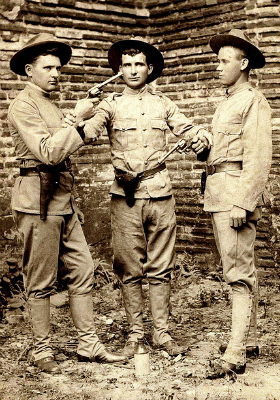Thomas E. Ricks's Blog, page 42
May 21, 2014
Introducing FP's Newest Channel: Tea Leaf Nation
May 20, 2014
Did the generous terms of the GI Bill help mitigate post-World War II PTSD?

I asked myself that question as I was reading an oral history of jazz
the other night.
The WWII GI Bill was very generous. Not only could you get an
education, you could get a mortgage. And you could stay unemployed for a year
while getting $20 a week.
John Graas, a French horn player, mentions in the jazz book that many
musicians in Los Angeles used the GI Bill to study music theory. I remember
reading also that some of the Beat writers found they could live on that $20 a
week in Mexico.
It made me wonder if the GI Bill had two effects; First, giving
American culture a boost (though I believe the injection of music theory into
jazz didn't do jazz much good, because I think that ideas began to elbow aside
emotion). Second, it gave a lot of new veterans time to reflect on their
experiences and absorb them.
In the book Over Here: How the GI Bill Transformed the
American Dream, Edward Humes lists dozens of actors, artists, musicians,
screenwriters, and others who learned their arts on the GI Bill, among them
Norman Mailer, Joseph Heller, Elmore Leonard, Rod Serling, Robert Duvall, and
Robert Rauschenberg. Not only did the money help the men, the influx of tuition
fees also kept many struggling schools from closing.
I'd be interested in reading a study of writers and others who did
time in combat (such as the poet Anthony Hecht) compared to
those who did not.
The shrinking of Kremlinology

Susan Glasser, speaking the
other day at a New America Foundation conference about the current Russian crisis: "It's
been very much a crisis about one man. Kremlinology has come down to
Putinology."
Marine MEU commander gets heaved

Col. John Merna was ousted as commander of
the 31 MEU on Okinawa for
"intemperate behavior," among other things. I'd like to know more about that. I
mean, sometimes people need a kick in the butt. Or was he just screaming at
everyone?
Meanwhile, former Virginia Senator and former Marine James Webb said he is
considering running for president. I am surprised-I thought he didn't like
being a senator and that he wanted to go back to writing novels. I think I have
read all of his.
May 19, 2014
Bensahel (II): Her critique falls short on the technological future of the military

I really like Nora Bensahel's critique of the U.S. military's inadequate thinking about the
future.
But the one part I found myself disagreeing with strongly was her plan for
"Ensuring U.S. Technological Superiority," which seemed to me overly
pessimistic about our technological future and also misdirected. It struck me
as rooted in the industrial approach used in the Cold War, which was an anomaly
in American defense history.
"Maintaining technological superiority over potential adversaries
has been a cornerstone of U.S. defense strategy since the end of World War II,"
she states. Yes, it is true that in the two decades after that war, the U.S.
government devoted enormous amounts of money to developing long-range bombers
and missiles, nuclear-powered submarines, satellites, and computers, as well as the
hydrogen bomb. The spending had huge effects on the civilian economy, leading
to the long-range Boeing 707 jet airliner and virtually creating the computer
industry.
We are not going to see that kind of spending again, as a
percentage of GDP. So I don't think her prescription of "maintaining U.S.
technological superiority [through] substantial investments in research and
development" points in the right direction: Rather, I think we can better
maintain technological superiority by tracking civilian innovation in computers
and UAVs and then selectively applying those changes to defense uses.
In other words, it is time to revive the concept of "defense
conversion" but reverse it. The old
sense of was the central theme of Bill Clinton's defense policy when he
campaigned in 1992. By that he meant stop making radars and start making
microwaves, and other civilian goods. I think it is time to think about defense
conversion again, but with the opposite meaning -- that is, finding military uses
for civilian products. Face it: Within a few years, Amazon and Google are going
to know much more about the operation of huge fleets of drones that the Air
Force or Navy will. They will run circles around command and control
arrangements the military develops. So the military would do well to focus on
how to apply that knowledge to combat situations, and also to make drones
stealthier and faster than civilians generally will want. If there is a role
for the old-line defense industry, it will be to "mil spec" civilian gear.
That said, Dr. Bensahel as usual has produced a fine paper. The
parts I agreed with articulated the issues better than I could, and the part I
disagreed with made me think. What more can one ask?
Six leadership takeaways I learned as a Marine combat logistician in Afghanistan

By Jeff Clement
Best Defense guest
columnist
After training as a
U.S. Marine Corps logistics officer, I deployed to Afghanistan as a truck platoon
commander with a Combat Logistics Battalion, running logistics convoys across
the Helmand Province to a support units from the United States, the United Kingdom, the Afghan
National Army and Afghan National Police. My book The
Lieutenant Don't Know tells my story and the story of my platoon in a narrative style. It's not written like a how-to manual, but
Mr. Ricks asked me to distill some of the lessons that I learned. The list that
follows might seem obvious -- but if they are so obvious, why are they so often
ignored?
"Water Cooler" Chatter Matters -- I can't even put a number on how
many times I found out about a potential showstopper for an upcoming mission
while talking with someone (often a low-ranking someone) waiting in the chow
line or getting a drink of water. "How
are things?" would occasionally elicit a response like "Eh, sir, we're having
some delays getting cargo loaded," that needed my attention. For junior personnel to feel comfortable
bringing these issues up relies on them having trust and confidence in you.
Seek Out Superior, Peer, and Subordinate
Mentors -- If you don't have
at least one mentor who is a peer, one who is a superior, and one who is a
subordinate, you won't be getting the full picture you need. Ideally, you'll have at least one mentor not
in your chain of command who can serve as a sounding board.
Take
Time to Explain Things As Often As You Can -- I am constantly surprised
with how little information flows more than two steps down the chain. Seek out backbriefs from your most junior
people and see what info they're getting, and what isn't making it to their
level. NCOs and junior officers usually
don't fail to pass all the information because they are deliberately
withholding it -- they're busy, and thinking about other things, so a harsh
reprimand is usually not in order.
Briefly take the time to correct misunderstandings one on one, fill in
the gaps in information, and constantly remind leaders to push info down the
chain.
Think About All Stakeholders and Make Sure
They're at the Table When Decisions Are Being Made -- At all levels, make sure that every
stakeholder is represented at the table.
We ran into many situations where our unit, which had been tasked with
supporting an operation, had not been included in the planning process. "Well,
the plan requires your convoys to travel at 25 mph to meet the Required
Delivery Date." Nobody making the plan
was aware that our convoys averaged 3-5 mph as a result of the rough terrain
and frequent IED strikes. The result was
that our capacity was often grossly overestimated and that our obligations to
other units were not considered.
Risk
and Uncertainty Must Be Accepted -- Senior leaders sometimes obsess
over "risk management." I had to prepare
an operational risk management worksheet for every combat operation, and
quickly learned that no operation would be approved unless it was "medium risk"
or less. Knowing that we were going to
be in a "medium risk firefight"...medium risk... the idea is laughable. You can do more harm than good as a leader if
you saddle subordinates with equipment and restrictions meant to reduce
risk. Train your people well -- and if they
are willing to accept a risk, then you should consider accepting it.
As a
Leader, Never Be Satisfied With Yourself -- This one, especially, bears
repeating. The best company commander I
know was always asking questions of juniors and seniors, reading books, and
privately admitted that he was upset with how little he felt he knew -- even as he
was well aware that he was far more knowledgeable than any of his peers. As soon as you think you know every inch of
your unit and its operations, talk to your most junior personnel about the
things they do. You will find at least
one thing you didn't know and at least one thing to fix.
Jeff
Clement commissioned as a logistics officer in the
United States Marine Corps and deployed to Afghanistan twice. He currently is
pursuing an MBA University of Maryland's Smith School of Business. He
lives in Washington, DC with his wife, Alison. His first book, The
Lieutenant Don't Know, was published in April.
Gay wife gets widow’s benefits

Once again, I am struck by
how quickly the American military, and American society as a whole, have
adapted to having openly gay soldiers.
It makes me wonder what other social changes have occurred for which
catastrophe has been forecast, but didn't happen.
May 16, 2014
Bensahel: Active-Reserve relations need to be overhauled -- and the Army is in trouble

Suddenly it seems like most of the smart thinking about the future
of the U.S. military is being done by women. Today's example is Nora Bensahel, who has issued a sharp critique of where the U.S.
military is at, with some recommendations about how it can do better.
One of her major points is that the relations between the active-duty
military and the reserves need to be overhauled, especially since "tensions
between the two components continue to escalate." She argues for revisiting the
idea of blended active-reserve units. This is of course a touchy area bristling
with political hot buttons, but that makes it something that OSD and Congress
especially can address. Perhaps Defense Secretary Hagel could make this a
project over the next two years.
One of Bensahel's biggest concerns is the future of American
ground forces. "Unfortunately," she writes, over the last two years, "DoD and
the Army have done little apparent work to determine the best way" to
regenerate ground forces.
Here she reinforces something I have heard from Pentagon
officials, which is that the Army today is perceived as the most troubled
service. I suspect this is in part because it is the one that seems most
reluctant to soberly review its performance in Iraq and Afghanistan. In other
words, the Army more-or-less subscribes to the view that it did everything
pretty much right in our recent wars, but that the civilians screwed things up.
There is no question that the Bush administration committed the primary errors,
but there also are many things the Army could have done better, beginning with
adjusting faster and seeing its strategic failings more clearly.
(More to come.)
Every time China oversteps, American interests in Southeast Asia advance

The neighbors notice. Chinese
and Vietnamese boats are bumping on the high seas.
Vietnamese are attacking Chinese-owned factories.
I remember reading that as early as about 1970, Hanoi was more focused
on Beijing as its primary adversary than on the lingering war with the
Americans. I hope we are now sharing satellite imagery and signals intercepts
with the Vietnamese government.
Rebecca's War Dog of the Week: A Puppy Postcard from the Royal Australian Air Force

By Rebecca Frankel
Best Defense Chief Canine Correspondent
Almost exactly one month ago, Osha, a military dog in the RAAF gave birth to 17 (yes, 17!) puppies. The litter, consisting of 11 males and six females, was the largest in the program's history. But all 17 puppies were born happy and healthy. And, from the photos, it looks like Mama Osha is going to have her paws full...


Rebecca Frankel is senior editor, special projects at Foreign Policy. Her forthcoming book War Dogs: Tales of Canine Heroism, History, and Love comes out on Oct. 14 from Palgrave Macmillan.
Thomas E. Ricks's Blog
- Thomas E. Ricks's profile
- 437 followers



